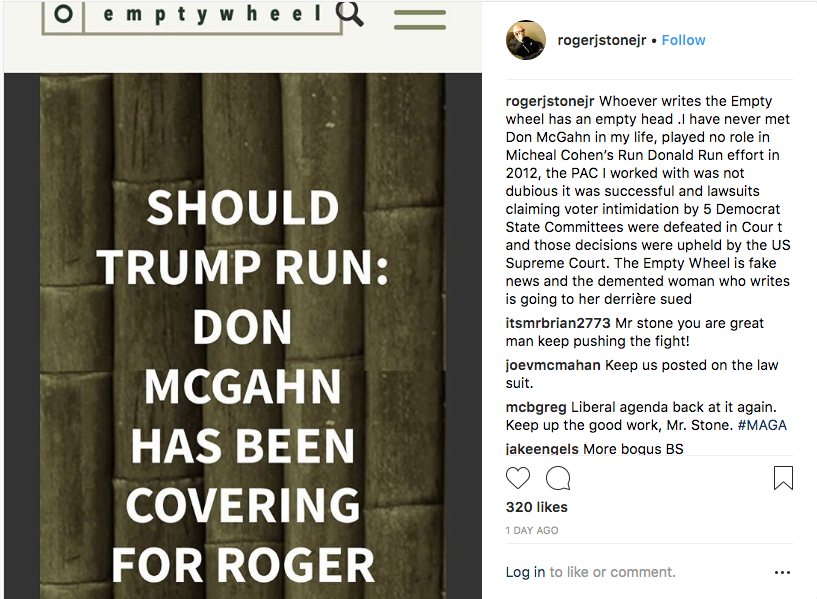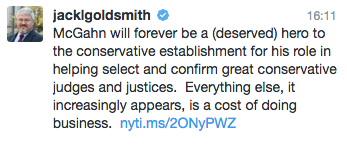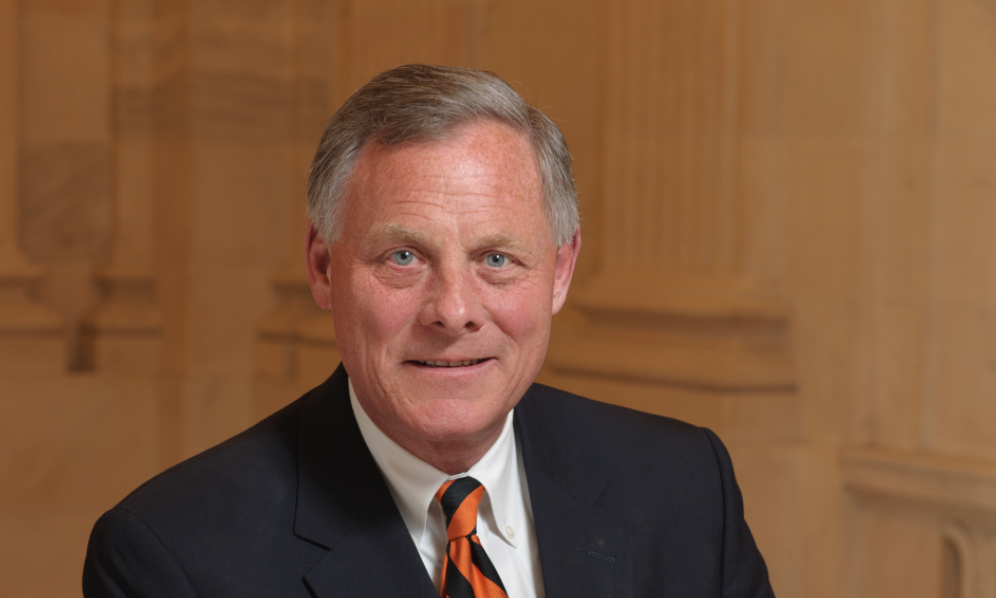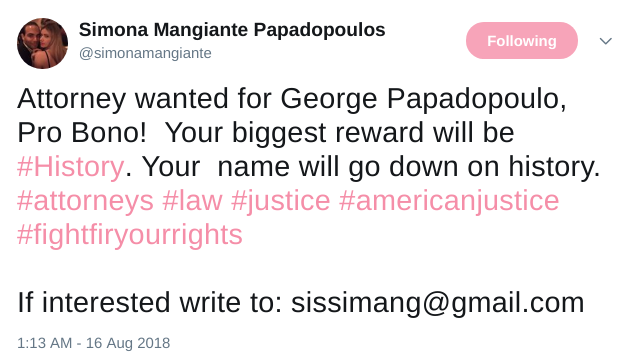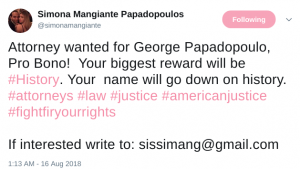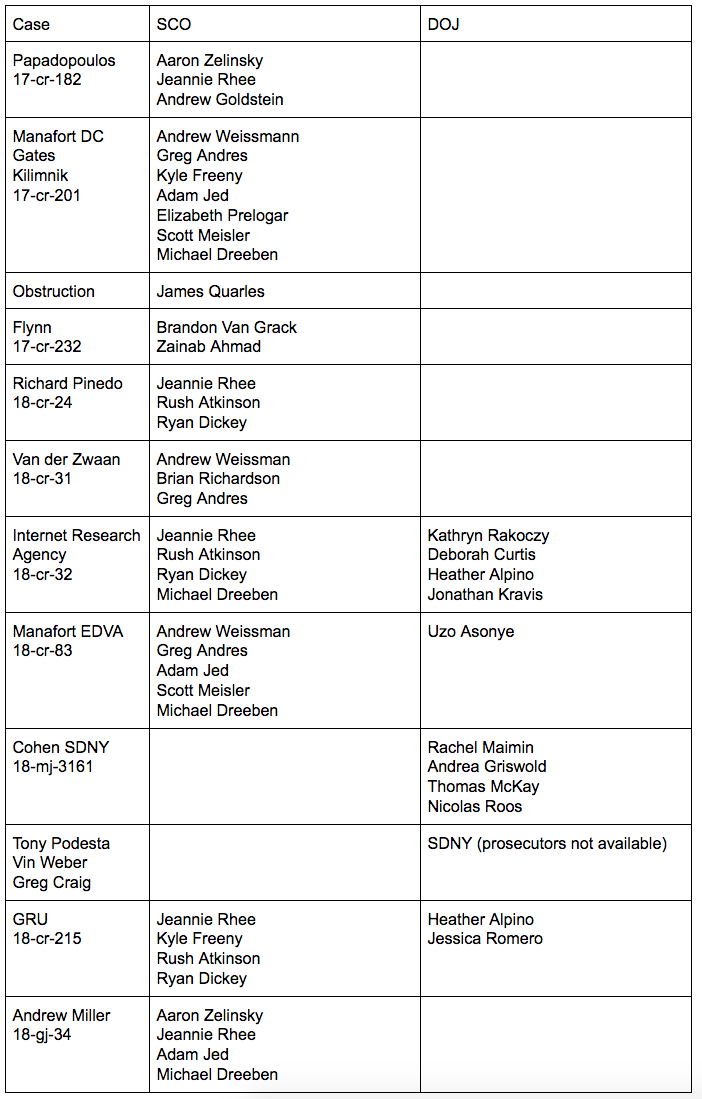As I disclosed last month, I provided information to the FBI on issues related to the Mueller investigation, so I’m going to include disclosure statements on Mueller investigation posts from here on out. I will include the disclosure whether or not the stuff I shared with the FBI pertains to the subject of the post.
I really couldn’t be bothered to get hot and bothered about President Trump stripping John Brennan of his security clearance. Brennan himself has been involved in the politicization of security clearances (perhaps most directly in Jeffrey Sterling’s case), and to have David Petraeus, of all people, complain about politicized security clearances, discredits the pushback. I’m far more concerned about the loyalty policing at EPA, Interior, Department of Education, and on the DOJ team attacking ObamaCare than I am about Brennan, because the bullying of those more obscure people will have a tangible effect on Americans’ lives. Indeed, the fact that Trump issued a declaration stripping Brennan of his clearance on July 26 but we only learned about it on August 15 is a testament to how little impact this has, other than the posturing around it.
But it has led to dangerous politicization elsewhere.
After being stripped of his clearance, Brennan wrote this op-ed.
In it, Brennan spends six paragraphs setting up how deceitful are Russians generally and his former counterpart Alexander Bortnikov specifically, and how successfully they recruit targets, including Americans, leading from a description of Russian “perfidy” directly to deeming election tampering denials “hogwash.”
Brennan then turns to Trump. He leads his accusation that Trump “colluded” with Russia by describing how asking for Russian to find Hillary’s missing emails “openly authorized his followers to work” with Russians.
The already challenging work of the American intelligence and law enforcement communities was made more difficult in late July 2016, however, when Mr. Trump, then a presidential candidate, publicly called upon Russia to find the missing emails of Mrs. Clinton. By issuing such a statement, Mr. Trump was not only encouraging a foreign nation to collect intelligence against a United States citizen, but also openly authorizing his followers to work with our primary global adversary against his political opponent.
Brennan then points to what he has read in “the reporting of an open and free press” to declare Trump’s claims of no collusion — as he had just claimed Russia’s denials of election interference — to be “hogwash.”
Such a public clarion call certainly makes one wonder what Mr. Trump privately encouraged his advisers to do — and what they actually did — to win the election. While I had deep insight into Russian activities during the 2016 election, I now am aware — thanks to the reporting of an open and free press — of many more of the highly suspicious dalliances of some American citizens with people affiliated with the Russian intelligence services.
Mr. Trump’s claims of no collusion are, in a word, hogwash.
The only questions that remain are whether the collusion that took place constituted criminally liable conspiracy, whether obstruction of justice occurred to cover up any collusion or conspiracy, and how many members of “Trump Incorporated” attempted to defraud the government by laundering and concealing the movement of money into their pockets.
In response, Richard Burr issued this testy statement, defending Trump’s action of stripping the clearance of a former CIA Director with whom Burr got along splendidly when he was spying on Burr’s own separate branch of government oversight committee.
Director Brennan’s recent statements purport to know as fact that the Trump campaign colluded with a foreign power. If Director Brennan’s statement is based on intelligence he received while still leading the CIA, why didn’t he include it in the Intelligence Community Assessment released in 2017? If his statement is based on intelligence he has seen since leaving office, it constitutes an intelligence breach. If he has some other personal knowledge of or evidence of collusion, it should be disclosed to the Special Counsel, not The New York Times.
If, however, Director Brennan’s statement is purely political and based on conjecture, the president has full authority to revoke his security clearance as head of the Executive Branch.
I’m offended by Burr’s statement not just because it ignores the plain language of Brennan’s op-ed, which it links, but for the epistemology of the Russian investigation suggested by the Senate Intelligence Committee Chair. Here’s the logic of the statement:
1. Brennan “purports” to know Trump colluded with a foreign power
Here, Burr ignores how Brennan defines it — first “authorizing his followers to work” with Russia by calling on them to find Hillary’s missing emails, and then “highly suspicious dalliances of some American citizens with people affiliated with the Russian intelligence services” — stuff that’s public. He also ignores that Brennan himself says he doesn’t know whether the “collusion” involved constitutes a criminally liable conspiracy. That is, Brennan is defining collusion as something less than a criminal conspiracy to cooperate to cheat on the election, but Burr doesn’t care.
2. Why doesn’t Brennan’s claim show up in the Brennan-led Intelligence Community Assessment?
Again, Burr ignores Brennan’s description of becoming aware of this in the time period after he “had deep insight into Russian activities during the 2016 election” — so after he left the CIA — and taunts him that the ICA Brennan oversaw showed no evidence of collusion. The implication is Brennan’s ability to know if there were collusion ended on January 20, 2017. (Burr is also ignoring that there were two different investigations even while Brennan was in government — the intelligence investigation led by Brennan, which by law should not be targeting Americans, and the several parallel counterintelligence investigations at FBI, which could investigate Americans.)
Burr then presents three and only three possibilities for how Brennan might have knowledge of collusion, once again ignoring the free press that Brennan clearly attributes it to. First, either intelligence, or personal knowledge:
3. If Brennan has something called “intelligence” proving Trump’s collusion, then it must have come from an intelligence breach.
4. If he has something called “personal knowledge” of collusion, then it must only be shared with Mueller’s team, not with the NYT.
That’s it, according to the Senate Intelligence Chair, for real information about collusion. Either it’s intelligence to which Brennan is no longer entitled (assuming, of course, that Gina Haspel would have no reason to share intelligence about Russia with Brennan in some kind of consultation, which — if Brennan did then pass that on publicly, would be the only proper reason to strip his clearance). Or it’s “personal information,” usually called “evidence,” which may only be shared with Mueller and not with the press. “Intelligence,” which is the purview of the Intelligence Committee and the agencies it oversees. Or “evidence,” which is the purview of a DOJ investigation. Either/or.
That’s, of course, illogical, and not just because Burr’s own committee is investigating some of the same “evidence” that the FBI is, notably what happened on social media and what some witnesses have testified about, in secret, to the committee, and witnesses to both (like Rob Goldstone) have also commented publicly.
It’s illogical, too, because there are other ways to get real evidence of collusion. I believe I have evidence of collusion. I shared it with the FBI, sure. But after I revealed that I had provided information to the FBI in July, I also shared limited parts of it with some Republican Congressmen, in hopes of explaining to them how serious the investigation is and showing that entire parts of it don’t derive from Peter Strzok’s decisions. I’ve also discussed, prospectively, sharing it with some former top intelligence officials (unsurprisingly, not Brennan), in the interests of elucidating parts of the Russian attack they missed.
Yet even though his either/or proposition is false, Burr then uses it to proclaim Trump’s treatment of Brennan proper based on this remarkable statement:
5. “If, however, Director Brennan’s statement is purely political and based on conjecture, the president has full authority to revoke his security clearance as head of the Executive Branch.”
Having set up this false either/or proposition, Burr then suggests anything else must be “purely political” and “based on conjecture,” and — without showing the logical relation between the two clauses in this sentence — states that the President has the authority to revoke Brennan’s security clearance.
(If NOT (intelligence or evidence,) THEN political conjecture) THEN strip the damn clearance.
It is true that thus far the case law suggests that a President does have the authority to strip Brennan’s clearance (though a Brennan challenge, or even more easily, a Bruce Ohr challenge, might establish new limits to that authority). But that authority has no relationship to the claimed political or conjectural nature of Brennan’s comments. Not only does Burr suggest it does — suggest that stripping security clearances because of speech perceived to be political is not just proper but justified — but by yoking these two clauses together in one sentence, Burr suggests punishing political speech is in some way intimately tied to the authority therein.
Plus, as Brad Heath noted, Burr’s statement argues that Trump was right to strip Brennan’s clearance on July 26 because of statements Brennan made on August 16.
The Chairman of the Intelligence Committee, mind you, made this statement.
But here’s the reason why I really care about this.
Back when he was CIA Director, I openly criticized Brennan for the way he worked the press to get the most hawkish read of the Russian attack into the press. But I didn’t think his efforts arose from partisanship. Rather, it was an effort to raise alarm bells about the attack in the last weeks of the Administration. Such use of the press happens all the time when Administration officials are trying to advance their favored policy decisions.
Burr, however, is using his position of authority to affirmatively tie security clearances to speech he (or the President) deems excessively political. He’s doing it even as he argues there are just two appropriate categories of weighing whether collusion happened or not, intelligence (his purview) or evidence (Mueller’s). And he’s doing it as his committee is leading what has, up to this point, been the only Congressional investigation not utterly discredited by partisan bickering.
That pisses me off for several reasons. First, Burr is in the same breath being a raging partisan and asserting that his committee is one of the only entities that can appropriately weigh whether Trump conspired with Russia to win the election. He’s putting a thumb on the scale at precisely the moment that he claims only he (and Mueller) get to decide whether collusion happened. This raises real questions in my mind about what would happen if and when SSCI came upon information that shows Trump conspired with Russia. It raises real doubts in my mind about whether SSCI is able to conduct their investigation.
More importantly, he’s wrong. He’s wrong for the obvious reason that journalists are discovering important threads of the Russia investigation. Indeed, the part of SSCI’s work they’re most proud about — Russia’s use of social media — came out of a lot of really good reporting on the topic.
He’s wrong because we’re a democracy and whether Trump conspired with Russia will one day be most critically decided in a political sphere. As we get closer to that day, the American public has every right to read these two data points together and consider whether they show Trump and the Russians conspiring.
“Russia, if you’re listening, I hope you’re able to find the 30,000 emails that are missing. I think you will probably be rewarded mightily by our press.”
For example, on or about July 27, 2016, the Conspirators attempted after hours to spearphish for the first time email accounts at a domain hosted by a third-party provider and used by Clinton’s personal office. At or around the same time, they also targeted seventy-six email addresses at the domain for the Clinton Campaign.
And he’s wrong because none of the certified experts are getting the Russia story entirely right. As I said, I’ve had conversations in the last several months with Republican congressmen, former top intelligence officials, and a whole lot of experts on the Russian attack, including (but not limited to) top InfoSec people, other journalists, and some key witnesses. Even aside from the stuff I went to the FBI about (which might give me special insight to what happened, but also has made me admittedly blindered about other issues) all of those people, including me, have missed key things or gotten key details wrong. Just as one example, in conversations I’ve had with that ilk of people, every single person save one has either misread key parts of the GRU indictment or read in their prior assumptions (the one exception had the advantage of being a key witness behind at least two paragraphs of the indictment). That’s just one example, but it’s an example that suggests we need more honest discussion and less of Burr and Trump’s attempt to decertify democratic speech about what the President did.
The Chair of the Intelligence Committee, Richard Burr, effectively asserted that he is one of the few authorities with the right to say, based off what his committee does in private, whether Trump conspired with Russia or not, and that any citizen deigning to weigh in based off the public evidence may be properly disciplined by the President. The statement goes a long way to discredit the investigation his committee is doing, a real blow to his staffers’ success at bridging any partisan divide. Most importantly, because it so badly gets the epistemology of an attack that targeted all Americans wrong, it raises real questions about Burr’s understanding of the Russian attack at issue.


